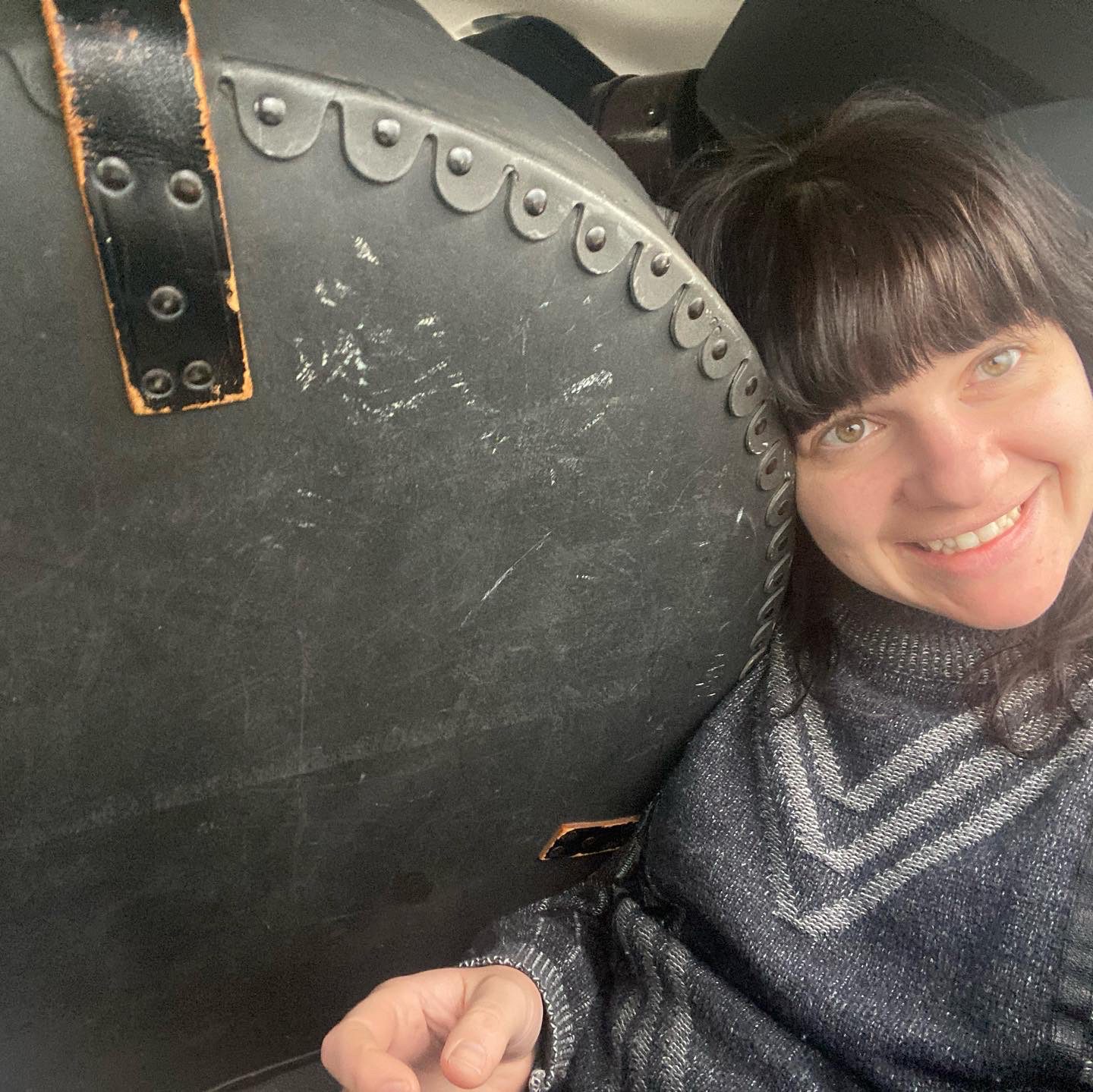THE LONG HAUL: Let’s Talk About the Numbers

Rachel Baiman finds room in the car nestled next to a bass drum case. (Photo by Rachel Baiman)
After my angry words last month about Spotify and the way that recorded music is being devalued, I had a lot of people asking why we musicians didn’t form a union or some kind of collective to fight for better royalties. For the record, there is a union, called the Union of Musicians and Allied Workers (UMAW) that is working very hard on this cause, along with many other groups and lobbyists both familiar and unfamiliar to me. And there are a million reasons why this will be a long and complex fight. But these questions and criticisms did get me thinking about the ways that musicians participate in their own oppression. This is going to be a hard one to write because I am absolutely a part of the problem. But I do wonder about how our need for perceived success prevents us from speaking honestly with one another about the real financial challenges we are all facing. And how that lack of conversation has led us to where the industry is today.
Musicians talk with one another all the time. We talk road stories, we talk business strategy, we talk booking connections, festival experiences, favorite new records, etc. But when it comes to admitting our saddest shows, or how little we are making off of the records we spent thousands to record, or the amount of money we paid to a publicist to get us that one good headline, we are reluctant to admit how much we are investing and how little we are getting out in comparison.
When it comes to social media, we are all trying to look like we’re doing better than we are. We post photos from certain angles to make the crowd look larger, we make small achievements sound fancy, we pretend that success has accidentally stumbled upon us without years of hard work behind the scenes. And most importantly, we never announce our disappointments, which are numerous and often brutal. Nobody wants to be a fan of a whiny, unpopular musician, so I completely understand why we use our public platforms this way, and I don’t think we should do it any differently. However, when it comes to seeing our peers, it definitely makes every one of us feel like someone else has discovered a secret to success that we don’t know about.
The way social media affects our psyche is a tired conversation. We all know how it works, the way it traps us. We try to quit and set boundaries but we are inevitably sucked back in by professional obligation and a desire to be a part of the community and see what is going on in the lives of our friends and heroes. The new realization for me is that this system of personal branding and advertising is also eliminating our ability to organize with our peers to fight for better conditions. How can we send out a rallying cry when we’re too afraid to admit that we’re hurting?
OK, so I’ll start. Inflation is kicking all of our butts, and gas prices are through the roof. As I write this, I’m on tour through the West and I have been so frustrated by the kind of deals we are seeing from venues that claim to be supportive homes for folk musicians. This week I’ve played two shows for which we sold 100+ tickets. At the first show the payout was $624 for three musicians, and the second was $421 for five musicians. We are trapped in the need to play these markets and get our foot in the door at these venues and being forced to accept deals that make absolutely no sense. Meanwhile, I just filled the van up with gas, and it cost $96, which is more than I personally made at the show last night, playing for 109 people who each paid $15-$18 to get in. I know that these venues generally mean well, but in both of these cases, the venue took more money than the musicians on what I would consider successful shows (one was, in fact, sold out).
Then, you have the industry conferences like Folk Alliance and IBMA. These conferences are the best way for bands and artists to meet industry players like booking agents, managers, and festival buyers. However, if you’re lucky enough to be chosen as an official showcase artist, then you have to pay the conference for the opportunity, to the tune of about $700. That does not include hotel rooms, food, travel, and fees that you pay to your band for playing with you. I’m planning to showcase at Folk Alliance this year, and I’m looking at about a $3,000 bill.
This is not a complaint: I obviously could have chosen not to play these shows, and I knew what the deal was ahead of time. This is intended as a rallying cry for us musicians to start asking for better. I also truly believe that most of these venues and organizations do exist because of a love of music and a desire to support music in the community. And luckily, tours are often buoyed by the rare and incredible venues and house shows that do pay generously. But now that we are back on the road, the reality of the changing landscape is starting to sink in. There must be a better way for us to move forward, but it’s going to require being honest about what’s going on behind the scenes.




